The No World Concerto by A.G. Porta
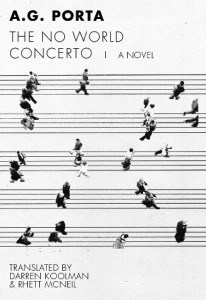 The No World Concerto
The No World Concerto
by A.G. Porta
Translated by Darren Koolman
Dalkey Archive (Spanish Literature Series), 2013
339 pages / $16 Buy from Dalkey Archive
I’ve been getting over this cold for about ten days now, and last week I had an especially bad night. I had taken 10mil of tussin pretty late, and now I realize the medicine was keeping me awake. At one point in the night my left leg lost circulation, and when I woke up, I thought, “Oh great, now that leg is entering the No World.” And as I slept, waking every hour or so, I had this creeping fear that more of me would fall into the No World. A terrifying prospect to be sure.
For A.G. Porta, the No World isn’t Bizarro World, but the subliminal articulated in a language we can’t understand. In The No World Concerto, out now from Dalkey Archive, A.G. Porta considers the limited tools we have for approaching reality and the so-called subliminal.
Like Cortázar’s 62 a Model Kit, The No World Concerto takes place in an unnamed city “the neighboring country’s capital” aka Paris. A “Screenwriter” obsessively writes a script that follows his relationship with a young piano prodigy, “the girl,” herself writing a sci-fi novelized account of their affair. The plot of The No World Concerto, comes across as somewhere inside and outside of all of these texts.
 The girl’s novel follows the story of an aging Alien-hunter.
The girl’s novel follows the story of an aging Alien-hunter.
Early on in The No World Concerto, the girl outlines her relationship to the No World:
I hear voices, the girl confesses. I think they come from another world. The young conductor asks her how she can be sure. How doesn’t she know the voices aren’t just inside her head? But she’s utterly convinced of it, and that should be proof enough it seems. The young conductor says no can know if something exists in and of itself outside the mind…They’re not even voices from this world, insists the girl, they’re from a false world, a No World created by some alien consciousness…(her novel) touches on this…the No World she writes and rewrites without ever getting anywhere; the No World that’s always expanding inside her, ever ripening, while never reaching maturity.
After co-writing a novel with Roberto Bolaño in the early 1980’s, Porta reportedly shut himself off from the world rereading Joyce and Wittgenstein. In No World, he lays the Wittgenstein on pretty early and pretty thick, highlighting the central paradox of the novel: Although our reality is bounded by language, language cannot describe all of reality.
Consider the joke: “Jean-Paul Sartre is sitting at a cafe. He says to the waitress, ‘I’d like a cup of coffee, please, with no cream.’ The waitress replies, I’m sorry, Monsieur, but we’re out of cream. How about with no milk?’”
For Porta, the act of literature is a negative act, naming thus negating imagined realities, because each “reality” corresponds with a multitude of unknown realities. Jacques Roubaud identifies this as the plurality of worlds. He says: (since I think/that the real/ is in no way real/how am I to believe/ that dreams are dreams)
So while the constant iteration of realities (via literature) might voice a critique towards a status quo, that critique will always be limited by the language we have. The infinite No-Worlds and Bizarro Worlds and alternate realities, (Crises on Infinite Earths, etc) of this world and reality are not really positive (or negative) mirrors, but rather frustrated slidings along an unknown continuum. Blanchot identifies this as the lot of author’s struggling away at a “work,” somehow existent, although ephemeral. Knowing that the transfer of this “work” from the subliminal kills it, and that the true triumph of literature comes somewhere in it’s ability to hold up the shortcomings of language.
While this might sound a little overwrought, Porta has a very light touch. And The No World Concerto is funny and enormously readable. Outside of her novel, “the girl” flirts with New Music stardom, adopting a John Cage-like rejection of rigid serialism in favor of indeterminancy.
Her Little Sinfonietta group performs a piece very reminiscent of The Green Table by Kurt Jooss.
By the third act, the “Screenwriter” sinks into mad-monk schizophrenia, and the action culminates in a very Robbe-Grillet-esque shocker. Although hailed in Spain as “one of the top ten Spanish-Language novels of the decade,” The No World Concerto resists simple interpretation, as it interrogates literature and compulsion in the modern world.
***
Joseph Houlihan lives and writes in Minneapolis, MN.
July 11th, 2014 / 10:00 am
The Whole of Life by Jürg Laederach
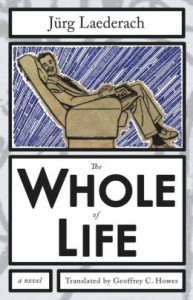 The Whole of Life
The Whole of Life
by Jürg Laederach
Dalkey Archive Press, Jan 2014
300 pages / $15 Buy from Amazon or Dalkey Archive
Waiting for the publication of Jürg Laederach’s The Whole of Life, out now from Dalkey Archive Press, I revisited his very funny and hip 1990 Semitext(e) collection, 69 Ways to Play the Blues. Laederach is a one-time enfant terrible of Swiss literature (he writes “I’ll be called a young writer until I’m eighty,”) and his work epitomizes boomer cool. A devotee of Jazz and Downtown Music, Laederach made several trips to NYC during the 1980s. 69 Ways was written on the third trip.
Laederach is an avowed devotee of improvisational music:
69 Ways crackles with wry observations. On Bleecker Street: I am Bleecker Street, “that intersects and eschews any rude display of house numbers.”
On the view from Swiss cemeteries: “To a majority of the inhabitants of Switzerland, death, not Lake Geneva, brings about a marked improvement in their standard of living. Great pains are taken to see to it that graveyards have a “view” they are thus conceived with a strong sense of landscape and perspective.”
When authors get hungry: “All he could do was point a shaky finger at a sandwich and growl.”
The Whole of Life shares this offbeat cool. Framed as a sort of messy first-person, the plot follows a Swiss everyman, Bob Hecht, (endearingly called “My boy Bob Hecht” a la Charles Mingus: Beneath the Underdog) as he navigates mid-century industrial Europe.
The book is very funny and sprawling. The ethos of improvisation is most noticeable in Laederach’s pastichework. Different styles and references are co-opted and incorporated as a sort of self-analysis. In one section, a year of unhappy cohabitation is narrated as a boxing match. In another, he parses out the existential implications of deleting a Jewish character from the text. He has persistent dopplegangers, including a pair supposedly co-writing his memoir. The text falls into stage directions. And technical directions: “PAN F Perceptol min 68 F 10 ASA 25 DIN 15 Microphen min 20 C 4 ASA 64 DIN 19 or 68 F 5 650 ASA DIN 29 with reduction to 125 … The kind of prose we can expect in the future.” But through all this, he maintains a detached cool.
April 18th, 2014 / 10:00 am
Dalkey Archive is having a Holiday Sale! Get 10 books for $65 or 20 books for $120. Awesome deal. W00t.
All Love is Lunacy: A Review/Interview with John Toomey
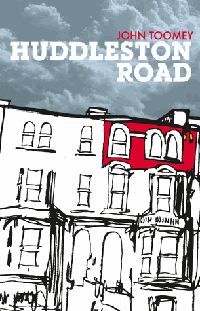 Huddleston Road
Huddleston Road
by John Toomey
Dalkey Archive Press, October 2012
160 pages / $15 Buy from Dalkey Archive or Amazon
John Toomey’s first novel Sleepwalker was an expertly cynical debut; something of a sprawling segue into Dublin as it’s then to be known to the reader and its excesses are as hilarious and compelling as they are cutting and insightful. That book is essentially what I think of as a hedonistic pipe dream put down on paper with nothing held back, with all the literary savvy of any of the contemporary masters describing chaos in the city, while retaining an originality that’s marked Toomey as an important presence in contemporary Irish literature.
His second book, Huddleston Road, is first and foremost a departure from that cynicism and mania inherent to the first. I’d argue that fans of the first book will immediately know the author’s work when they begin reading his second but the shift away stylistically is undeniable; and quite impressive. Consider, for a moment, the first books of Jay McInerney, or Bret Easton Ellis, each American authors who began with dark comedic forays into metropolitan chaos. One could argue that McInerney has grown away from this over the years but he’s always retained some of that sensibility, and the same certainly goes for Ellis, ten-fold. Although I’m a tad hesitant to draw comparisons to the first books of either of those writers (of considerably different movements than Toomey) the general point I’m hoping to make is that the writer challenged himself in starting out with such a distinctly-crafted epic as Sleepwalker, and—all the 2nd novel mythos aside—Toomey has managed to show here a different set of literary chops, while retaining the maniacal attention to detail so prevalent in the first book.
It follows a young Irishman named Vic. Vic leaves Dublin for London early on in the novel and through no real preference of his own winds up teaching history and such to teenagers. Again, through each moment, each paragraph, each sentence, the importance of this book seems to be that wild attention to detail Toomey seems to have great control over. A young man standing at a party is never simply that, but an opportunity to explore the ramifications of standing at said party and the physical details of those present and the questions running through young Vic’s mind. At times it reads as a sort of summary of this character’s thoughts and yet the vivid moments of dialogue and scene give striking reality to each moment when you find yourself so ingrained in this character’s reactions to moments that you forget the moments themselves.
Because this will also be an interview, and because I’m hardly interested in giving a moment-by-moment account of the novel’s content, I won’t delve that much deeper into the goings on in Huddleston Road except to address perhaps the most important part: Lali. Lali is a girl Vic finds himself desperately attracted to with every moment that passes. She doesn’t seem interested and even acts like a bit of an asshole at first and yet this draws Vic slightly more to her so that when he’s finally given a chance to sit and speak with her his mind is torn asunder with thoughts and worries and chaos and yet he cannot help himself. This is, I’d argue, a love story. There are moments that make it considerably different than most love stories you’ve read and will read, but all the same there are tropes at play here that make this book a fresh spin on the old magic of two people falling in love in spite of terribly difficult circumstances, and the ramifications in both of their lives as a result of this.
November 19th, 2012 / 12:00 pm
Bourbakists for memory, unite! Jacques Roubaud’s MATHEMATICS: (a novel)
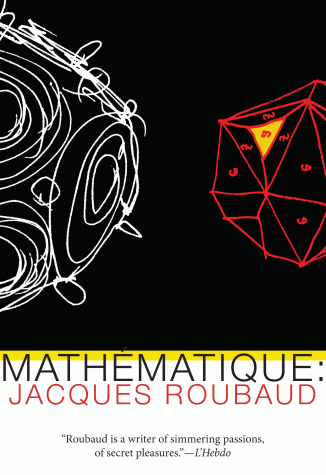
Mathematics: (a novel)
by Jacques Roubaud
Dalkey Archive, 2012
312 Pages, $14.95
Buy from Dalkey Archive or Amazon
Jacques Roubaud, a premiere intellectual force throughout the history, to some extent, of French letters, as they say, is primarily known to American readers as a member of the OuLiPo and a poet. Roubaud’s reach, however, spans far beyond these simple categorical realms, throughout his massive ouevre of work, much of which has actually be translated into English.
Mathematics:, while recalling ideas, perhaps, that come up in specific OuLiPian exercises, is not inherently an OuLiPian work, nor is it a work of poetry. The cover of the book, in Dalkey’s translation, presents the work as “a novel,” and to an extent, within the heterodoxical forms that a novel can take, it is indeed a novel, but in the bookstore-culture of American publishing, it would find a place more comfortable within that loose genre of the memoir, the autobiography, the academic term of ‘creative non-fiction.’
The book at hand is the third “branch,” as Roubaud himself calls them, of a larger project dealing with the issue of memory and also, really, Roubaud’s life. And Roubaud has had a full intellectual life, in his work and his academic career, his interactions with the French literati, his presence in the OuLiPo, his poetry and, as it turns out, his career in mathematics.
Copy on the back cover of the book presents the idea that Roubaud is one of the few writers who has successfully bridged the gap between left brain and right brain thinking, hyperbole to an extent because I would insist that there is not such a clear divide in the generation of texts, but there’s a literal application in Roubaud’s mathematics career, and how it’s affected his interactions with the OuLiPo. But, regardless, despite exploring the branch of his own life that is in tangent with his career in mathematics, this insistence is no more than a structural system for Roubaud to explore memory within this specific realm of his own personal history.
There’s nothing too exciting about the literal events that occur within this branch of Roubaud’s life if you’re not connected to a historical exploration of the development of mathematics, specifically in France, from the early 1950s to the mid-1960s. It is interesting to read about, but there’s nothing specific to launch onto–so really, the question is, what’s the draw to read 300 pages of Roubaud’s life as it connects with mathematics?
The answer is simple, and beyond any sort of right brain articulation–Roubaud writes with a pleasantry that moves swiftly, a story-teller of diversions, splitting his own history into the rhizome of existence, a refusal of a straight narrative, an abundance of (as Roubaud himself points out) non-essential details, simply the creation of a narrative space.
There is no explicitly beautiful language present, as it seems that Roubaud saves that for his more highly emotional works (the incredible beauty that’s present in some thing black, Roubaud’s book of poetry written after the death of his wife Alix Cleo Roubaud, is nowhere to be found here). Instead we move through the maze of memory, constructed within a labyrinthine Proustian totality. Roubaud addresses the reader throughout the work, explaining the project, offering his insistence on the work both as exercise and project, aiming towards, perhaps, an unspoken totality, but this is not the totality that Mallarmé was after with his notes toward le livre, rather this is just a re-articulation of a full life in the form of the book.
Roubaud himself being an interestingly detached character, the scenes that occur are both instantly understandable and curiously casual–in fact, Roubaud’s decision to arbitrarily move from poetry and language into mathematics is an understandable one: there’s this thought, perhaps, a thought that I share at least, that in some way mathematics offers an answer to all the questions we as writers have; mathematics offers a totality to these great ideas of life. None of us could say how, and even if we were to attain the level of higher mathematics required to understand the really heavy and earth-shattering proofs that have arose within mathematics throughout its continued development, the lever of pure abstraction wouldn’t offer any solace. But it’s a quantifiable goal, an idea that while maybe we won’t understand the answer, we’ll at least have it.
And through this there is hardly nothing present outside of Roubaud’s interactions with mathematics–there are tangents that arise, tangents of humanity, but only when they’re linked to the mathematical narrative, through people and places met and involved through classes, other professors, drinking soda in the army, reading treatises on algebra in the desert during the war, watching a woman always wait for the train at the same time; all of these things don’t add up to a point, they simple contribute to a life, life as a whole, as something imperfect and incomplete, as something that can be interesting exclusively in the way it’s told to someone else.
November 1st, 2012 / 8:55 pm
With the Animals
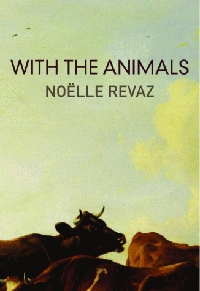 With the Animals
With the Animals
by Noëlle Revaz
Translated by W. Donald Wilson
Dalkey Archive, May 2012
232 pages / $22.95 Hardback; $14.95 Paperback. Buy from Dalkey Archive or Amazon
Originally published in French as Rapport aux bêtes by Gallimard, Paris, 2002
Sometimes a book comes along that is written in a voice so bizarre and so steadfast, so almost chant-like, that it worms inside my head and plays over and over until I find myself unconsciously putting its somewhat archaic words and phrases to everyday use. Whilst reading With The Animals, I am all of a sudden “canoodling”, “yammering”, “palavering” and “gallivanting” through a world furnished with “snot-rags” and “flyspecks”, “gizmos” and “critters.”
With The Animals is the second novel by Franco-Swiss author, Noëlle Revaz, and the voice from which I am stealing is that of Paul: a middle-aged dairy farmer, husband to Vulva and father of “six brats at least.” Paul is a hardworking, hard-drinking, hardhearted man, and his is a life of self-inflicted hardship. Paul is all passion before sense, all anger and hunger and lust. If there are any crumbs of true affection in his shrivelled turd of a heart, then every last one is reserved for his cattle. “Yet I know what it feels like, the way it is when you love”, he says, “you keep squying at her and sighing, you have the everlasting fear something bad might occur to damage her about the horns or make you call the vet.” Paul treats his herd with a tenderness never extended toward his human family. The children have presence only in passing: they idle around the farmyard, they whisper to one another in their beds at night, they skitter instinctively from their father’s path whenever he approaches. At one point, Paul boasts how “all them cows, I know them and I have their names by heart. I can tell when they was born, what diseases they’ve had, and their mother’s name.” Whereas on the subject of his offspring, he is quick to confess how he’s “never able to take to them nor put their names on each.”
June 22nd, 2012 / 12:00 pm
The Faster I Walk, The Smaller I Am
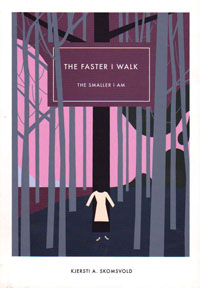 The Faster I Walk, The Smaller I Am
The Faster I Walk, The Smaller I Am
By Kjersti A. Skomsvold
Translated by Kerri A. Pierce
Dalkey Archive Press, 2011
147 pages / $17.95 Buy from Dalkey
Originally published in Norwegian as Jo Fortere Jeg GÂr, Jo Mindre Er Jeg by Forlaget Oktober A/S, 2009
Although I know I shouldn’t, sometimes I judge a book by its title.
At first glance, The Faster I Walk, The Smaller I Am might suggest some kind of self-help manual advocating weight loss by means of low-intensity cardiovascular exercise. But putting the title aside and judging instead from the book’s front cover, (something else I know I shouldn’t do,) it’s clear this could never turn out to be the case. The copy I have, the hardback Dalkey Archive Press 2011 translation, sports artwork reminiscent of a Marcel Dzama painting. In a forest of leafless trees against pink-purple sky there is a woman standing with her back to a trunk, iniscernible save for her white dress and white shoes. The woman turns out to be Mathea Martinsen, and the title turns out to be a reference to Einstein’s theory of relativity, and the book’s content turns out to be a candid portrayal of losses far greater than that of a few inches around the waistline.
Skomsvold writes from the point of view of the front cover’s indiscernible woman. Mathea is childless, widowed and “almost a hundred, just a stone’s throw away.” All of her life, she’s been overlooked. “The spun bottle never pointed at me, the neighborhood kids never found me when we played hide-and-seek, and I never found the almond in the pudding at Christmas…” Now she lives alone in the same apartment block in Haugerud, a suburb of Oslo, where she has spent all her married life. Mathea likes to knit ear-warmers, read the obituaries and start new rolls of toilet paper. She is surprisingly proud, yet appallingly lonely – so lonely she listens to the distant sound of sirens and wishes they were coming for her, so lonely her only sense of fellowship is achieved by buying the same groceries as strangers she passes in the aisles of the local store.
March 23rd, 2012 / 1:00 pm
Uh oh. Time for byebye money. Dalkey Archive’s yearly holiday sale, with 10 books for $65 or 20 books for $120.
Best deal in town for rad literature: DALKEY SUMMER SALE. Up to 60% off and free US shipping, running through June 15th. Go.
Four Brief Notes of Varying Significance
If you’re interested in antique printing, there’s a whole plant for sale in Boston.
I love stand up comedy so I really enjoyed this profile of comedian Greg Giraldo and his untimely passing in The Awl.
Mima Simić writes a disturbing account of how her work was edited, without her approval, for Best European Fiction 2011, by an editor at Dalkey Archive. One of the edits assigned a gender to the narrator when the gender ambiguity was a deliberate authorial choice. It’s not a good situation.
Vida released a count for how women writers are represented across several publications great and small during 2010. Meghan O’Rourke responds at Slate. The numbers are not surprising. The issue is, of course, more complex than mere statistics but statistics are always a good place to start. I find the numbers disheartening. Actually, I think it’s fucked up. I do. I understand if you don’t and why. We’ve had this conversation already but I thought I would share the latest numbers.
